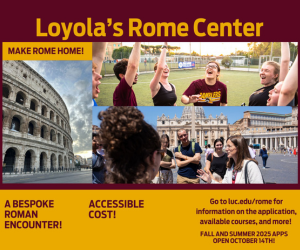Rome Start students reflect on their time there.
‘I Wouldn’t Trade the Experience for Anything’: Rome Start Global Scholars Program
First-year María Miller said she didn’t know about Loyola’s Rome Start Global Scholars Program until she saw it listed on the university’s Common Application.
Now a current Rome Start student, Miller said it’s been a once-in-a-lifetime experience.
Loyola’s Rome Start program allows admitted Loyola students to spend their first year of college studying at the John Felice Rome Center in Italy. Once the school year comes to a close, the Rome Start students — colloquially known as Rome Starters — finish their education on the Chicago campus.
The program is a great way for students to combine their Loyola education with global experience, according to Rome Start coordinator Luca Badetti.
“It’s such a unique and incredible opportunity — and I don’t say that just because I’m the coordinator,” Badetti said. “You get your American degree from Loyola University Chicago and you get to have a year in Rome.”
This year, there are 22 Rome Starters at the JFRC. Each Rome Starter is required to choose one of three focus areas based on the Jesuit education — human rights, sustainability or international business.
“The Rome Start Global Scholars Program really strives to help students lead lives that create positive social change in whatever their interests are,” Badetti said. “In all of that, there is a sense of, ‘How do we create a more just society?’”
Two classes relating to the chosen focus area must be taken per semester. At the end of their studies abroad, the students receive a Global Scholars certificate.
Current Rome Starters Kayla Wejzgrowicz and Miller both chose the human rights concentration, through which they were able to visit the Joel Nafuma Refugee Center, located in the crypt of St. Paul’s Within the Walls Episcopal Church. There, refugees are provided with food, counseling and language lessons.
The ability to travel Europe is a draw for many Rome Start students and because of the year-long time frame, students feel less pressed for time, according to Rome Starter Andrea Raj.
“When you’re here for one semester, you take up all the time and you’ll go travel everywhere and do everything you need to do,” Raj said. “When you’re here for a whole year, it’s much more relaxed.”
Raj said Rome and the JFRC have become places she considers home. She said this makes her scared to depart from Rome, since living there has become her new normal.
“Rome has become familiar,” Raj said. “I’ve definitely blended in more, which is really fun. This semester, everyone talks to me first in Italian. I’m like, ‘I don’t know a hundred percent of what you’re saying, but thank you.’”
Alegra Vierra, a forensic science major from New Mexico, said she needed to navigate the Italian healthcare system after she tore her meniscus.
Vierra said she dealt with frustrations ranging from denied health insurance to undergoing physical therapy in what she said felt like a “fake” doctor’s office. She said it seemed to be an office in the middle of an apartment basement.
While not all Rome Starters’ stories are so intense, there’s still a common struggle in adjusting to life abroad, Wejzgrowicz said.
“It was difficult managing, or balancing, homesickness with the excitement of being somewhere new,” Miller said.
Veronica Collins, a secondary education major from Lisle, Illinois, also found the distance from home to be challenging. She said the transition to Rome was made more difficult and stressful by the separation from her parents.
Wejzgrowicz said the tight-knit nature of the program helped her handle the transition abroad.
“Having other people in the same situation helped a lot,” Wejzgrowicz said. “Knowing that everyone else is feeling homesick, everyone else is stressed out, no one else knows how college works. We definitely found support systems in each other.”
The cohort is able to take school-sponsored trips to Italian cities like Perugia and Orvieto, where they get to know each other better. The Rome Start students also engage in community programs together, like the United Nations’ Food and Agricultural Organization center in Rome, Badetti said.
Badetti himself provides individual support to the Rome Starters, making time to meet with students periodically and discuss their wellbeing — whether socially, academically or otherwise.
Parker Zerick, a 2019-alumni of the Rome Start program, said Badetti was “the star of the show” during his Rome Start experience.
“I don’t think I’ve ever met a kinder man,” Zerick said. “He was always there — ready to listen, ready to give advice. He was always happy, and it made everything feel alright.”
Badetti said even the uncertainty of being abroad has its benefits.
“I think it’s important that students leave with more questions than answers,” Badetti said. “So hopefully their time here helps them come up with new questions and grapple with new things they haven’t considered before. And that can set them onto a path of discovery, which I think can be very transformational.”
Despite the small community in Rome, students said they struggle with insufficient communication from the Chicago campus — exacerbated by time zones.
“You’re on a seven-hour time difference,” Wejzgrowicz said. “So being able to communicate and have resources — there’s a lack thereof.”
Raj said she felt like Loyola was particularly uncommunicative when it came to obtaining her Student Visa for the program.
“They didn’t give us much information when it came to the documents we had to fill out and so that was a struggle I figured out myself,” Raj said. “In June, they gave us full written-out ones, but by then I had already sent mine in to the post office.”
Student Visas are federal immigration documents required for students to legally study abroad in a specific country for a specific date range, according to Northwestern University’s Global Learning Office.
On the website for the Italian Consulate in Chicago, students can access the exhaustive list of the documents necessary for their applications — either mailed in or delivered in-person at an appointment. The consulate recommends starting the visa process months in advance.
Badetti, who has been the program coordinator since 2019, said the JFRC’s relationship with the Chicago campus is like a dance or a synergy.
“In the fall, in UNIV 101, I help inform students of what opportunities are available on the Chicago campus,” Badetti said. “But of course, they’re here, right? So until you’re there, it can sound a bit abstract. So I think a lot of the learning happens there.”
Zerick said he found the hardest part of the transition to Chicago to be the lack of knowing people. His unfamiliarity was only aggravated by his second year being completely online due to COVID-19. He said his first time visiting the Chicago campus was when in-person classes resumed his third year.
Sarah Murray, a political science and chemistry double major, said she has faith in her Rome Start cohort when it comes to adjusting socially on the Chicago campus.
“It will be hard, the actual transition, since we aren’t going to know anyone really in our grade,” Murray said. “But I feel like it’ll be fine, because we’ll have each other still. And also a lot of people who choose to do this program are also very extroverted. So I think we’ll do fine at making new friends. But I think that’s probably the part most people are scared about.”
The JFRC offers few science-based classes, focusing instead on core and humanities classes. Raj, a pre-med psychology major, said the lack of science courses sets her back in her academic plan.
“I’m going to be a sophomore, but I’m nervous because I’m basically going to be like a freshman again,” Raj said. “Because I’m behind. I should’ve taken PSYC 101 this year, but I have to take it next year, and I’m going to be one of the only upperclassmen there.”
Some of the JFRC classes are on-sites, where students meet their professor somewhere in Rome and spend class time on foot, exploring the city.
Recently, Rome students gained two points of contact on the Chicago campus — Joel Maidens, the associate director for the first-year experience, and Annie Keller, the assistant director for orientation and student transitions.
Badetti said Maidens is planning smaller transition orientations for the students where they can meet a JFRC Rome Start alumni presence and be introduced to the campus.
In an email to The Phoenix, Maidens said this orientation is to be scheduled during the week of Aug. 19.
Additionally, Badetti holds an open-forum meeting each spring with the Rome Start students to answer any questions they may have regarding the move to Chicago.
“I wouldn’t trade the experience for anything,” Zerick said. “I could’ve gone to another university and had the traditional track of spending the same four years on campus. But where’s the fun in that?”
Featured Image by Holden Green / The Phoenix
-

Catherine Meyer is a third-year student majoring in history. She works as The Phoenix’s Deputy Arts Editor and Horoscope Editor. She enjoys writing humorous essays and feature articles about the people of Rogers Park. When asked what the weekly horoscopes will be, she’ll answer, “Pick up an issue of The Phoenix on Wednesday and see.”
View all posts




